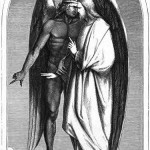We run our website the way we wished the whole internet worked: we provide high quality original content with no ads. We are funded solely by your direct support. Please consider supporting this project.

The Ultimate Criteria for Theology
Theology is thinking (logos) about God (theos). It is a good and necessary discipline, but only so long as it is centered on Christ. All of our speculation and debate about such things as God’s character, power, and glory must be done with our focus on Jesus Christ—more specifically, on the decisive act by which he reveals God and redeems humanity, his death on the cross.
The definitive thing to be said about God’s character is found here: God dies for sinners on a God-forsaken cross.
The definitive thing to be said about God’s power is found here: God allows himself to be crucified on a cross for sinners.
The definitive thing to be said about God’s glory is found here: God dies a horrifying, God-forsaken death upon the cross.
God’s character, power and glory are decisively revealed on the cross. Though it is “foolishness” to the natural mind, the cross is the power and wisdom of God to all who believe (1 Cor 1:18f). If we entertain concepts of God’s character, power, and glory that are inconsistent with what is revealed here, our thoughts are outside of Jesus Christ. Every thought about God, every mental picture we entertain about God, every single emotion that is “raised up against the knowledge of God” must be taken “captive to obey Christ” (2 Cor 10:5).
The true God revealed in Jesus Christ is not at all what the natural mind would expect—it is “foolishness”—for our natural expectations are influenced by our experiences in a fallen world that is permeated with the foundational lie of the serpent. We create a god of our own designs by magnifying our own fallen conceptions of character, power, and glory. Consequently, sometimes God’s character, power, and glory are presented in ways that don’t even resemble Jesus Christ, even within the Christian tradition. For instance, we often project onto the screen of heaven a cosmic Caesar, controlling the world through coercive power and intimidation rather than accepting God’s definition of himself in the crucified Jesus Christ. Such mental chimeras may inspire fear, but they do not transform us to become outrageous lovers.
The only hope we have of getting out of this fallen condition and walking in the ecstatic love of the triune God is to resolve that God’s revelation in Christ is true, however much it may contradict our fallen, worldly expectations. When the deceptive veil over our mind is removed and we see the glory of God shining in the face of Jesus Christ and when we fix our eyes on Jesus, we find a picture of God that could not possibly be more loving and beautiful. For here we find God going to the greatest extreme possible—suffering a God-forsaken, hellish death at the hands of the very creatures for whom he was dying! This is the greatest expression of love imaginable, and it alone reveals the truth about who the eternal, triune God is. God is this kind of love.
This is the ultimate criteria for all theology. Any other estimation of God will block not only our ability to think rightly about God, but also to love like God loves.
—Adapted from Repenting of Religion, pages 132-133
Image by brownpau via Flickr
Category: General
Tags: Cruciform Theology, God's Character, God's Love, Theology
Topics: Theological Method
Related Reading

Benefit of the Doubt Is Here!
Benefit of the Doubt is finally here and you should definitely get yourself a copy! Frank Viola interviewed Greg about the book recently and you can read it over on Frank’s blog Beyond Evangelical. In fact, Frank is so enthusiastic about the book that he added it to his Best 100 Christian Books Ever Written list. Wow. Also,…

Reviewing the Reviews: Tom Belt (Part 2)
In my previous post I reviewed Tom’s critical review of volume 1 of CWG, and in this post I’d like to do the same for his critical review of volume 2. As he did in his review of volume I, Tom begins with some praises and points of agreement. He thinks my quest to discern “what…

What Does Spiritual Warfare Have To Do with the Cross?
Last week, we covered a few posts on the nature of the Atonement and the Christus Victor view. The following continues this theme, specifically looking the motif of spiritual warfare and how it relates to Christ’s work on the cross. This is an adaptation from Greg’s article in The Nature of the Atonement: Four Views. …

The Problem with Christocentrism
As we’ve discussed in the previous posts, there has been a growing move toward a Christocentric orientation in theology since Barth, and especially over the last fifty years. I enthusiastically applaud this trend, for I’m persuaded it reflects the orientation of the NT itself, so far as it goes. The trouble is, it seems to…

Court-of-Law Theology: How It Falls Short
Courtney “Coco” Mault via Compfight Last week, we introduced a way of talking about theology with concentric circles. This approach is distinct from the common Western model of theology that depends upon a court-of-law framework. The following is an excerpt from Greg’s book Benefit of the Doubt regarding this: ____________________________ Within the legal strand of…

Sermon: Diaper Power
In this short clip from Greg Boyd’s Sermon Diaper Power, he introduces the theme of the sermon where talks about how the poverty of the manger exemplified the power of God. In this sermon, Greg shows that God really is like the baby swaddled in clothes in the manger. The kind of power that God…
